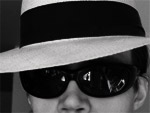My First OR Rotation: Week 1

Week of: 02-19-2007
Abstract: I begin my OR rotation
Mood: Cheerful, calm & quiet
What went well: I integrated many of the dynamics of the OR.
What needs work: There's still a lot to learn. Strong personalities in the department.
Elucidation:
Imagine your favorite crazy uncle who always is cracking jokes and you have a good picture of the lead tech in the OR. He's a real hellion but a lot of fun. His first words Tuesday were, “Why don't you go to the cafeteria to get some breakfast.” Which certainly sounds tame enough. I won't describe the other things he said, yet.
My first day in OR rotation started with a feeling of trepidation. I often get the jitters during any activity that is new. What makes it different of course is that the area around and between tables is considered sterile.
It's critically important that no one other than the scrub nurse/tech and docs touch the area. I've always been some what spatially challenged. Case in point was my short football career in high school: unmitigated disaster. I've improved in this regard since my ungainly years as a youth.
So what happened? I nearly touched the field twice in one 30 second period. The tech, a woman, pulled me by my scrubs and whispered sharply, “NEVER TURN YOUR BACK TO THE STERILE FIELD.” Wow. On Thursday, the lead tech (Crazy uncle) said something similar when we walked to a room. “If you touch the sterile field your ass is grass.” He needn't have said this.
But you know it worked. From then on I'd look in the window of the suite to assess the position and best approach to bring the equipment in.
The first tech was an encyclopedia. She explained just about everything she did during a capitulum reconstruction. She talked about the controls of the C-arm, technical factors, and who all the personnel involved were.
I found it all fascinating to say the least. Looking into an open abdomen for example, really leaves a mark on a young tech. I saw a surgeon draw a strand of the tricep upward during the capitulum reconstruction.
But I must say it brought me pleasure at the end of my shift on Thursday when the lead tech said, “You did a good job today.” I smiled. I'm smiling now.
Goals for next week:
It's all very basic for now:
Just get in to the rooms and watch, observe and take notes.




